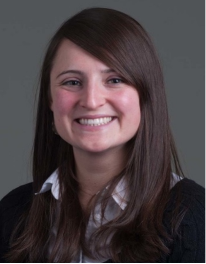
The Center for Water Policy at the UWM School for Freshwater Sciences has named Laura M. Suppes, PhD, MPH, REHS as the 2022-23 Water Policy Scholar. Suppes is an associate professor in Public Health and Environmental Studies at the University of Wisconsin–Eau Claire.
The Water Policy Scholars program brings policy researchers across the UW System together with freshwater scientists to frame policy questions and adapt tools to address water resource issues. The program is intended to increase the Center for Water Policy’s capacity to develop interdisciplinary and sustainable solutions to freshwater problems.
As a Water Policy Scholar, Dr. Suppes will address per- and polyfluoroalkyl substances (PFAS), which are persistent, harmful, emerging contaminants present in Wisconsin ground water used for human consumption. When ingested, PFAS are associated with adverse health effects. Dr. Suppes’ Water Policy Scholar project, Model development for Assessing Illness Risk from PFAS Ingestion Exposures in Wisconsin, can help inform policy making around this emerging contaminant in water quality safety and public health. Water quality safety and emerging contaminants is one of the Freshwater Collaborative of Wisconsin’s ten grand challenges.
Dr. Suppes’ research aims to assess the risk of adverse health outcomes from PFAS exposure in Eau Claire, WI residents. Eau Claire has more than 68,000 residents who rely on ground water as the source of municipal drinking water. PFAS were discovered in four of Eau Claire’s 16 municipal water wells during summer of 2021. Although Eau Claire’s water utility has stopped using the contaminated wells, residents consuming municipal drinking water prior to 2021 were exposed to PFAS.
Exposure data unique to the Eau Claire community, like average water ingestion volumes, will be collected and analyzed. Results will be shared with the Eau Claire City-County Health Department for use in public health messaging about PFAS exposure and illness risk, if any. The developed risk assessment model will be accessible to the UW Water Policy Network for use and dissemination. In the model, exposure inputs can be customized to assess illness probabilities in other areas of Wisconsin where PFAS have emerged as a drinking water contaminant. Community leaders, researchers or decision makers can use the model to assess illness probabilities unique to Wisconsin communities, helping guide policy decisions.
Suppes received her MPH in Public Health Administration and Policy from the University of Minnesota and PhD in Environmental Health Sciences from the University of Arizona. Her research interests are chemical and biological hazard identification and remediation in water, exposure assessment, and quantitative microbiological risk assessment. Her most recent research focuses on surveying indicators of nitrate contamination in private well water and assessing the impact of cyanuric acid on risk of gastrointestinal illness among swimmers.